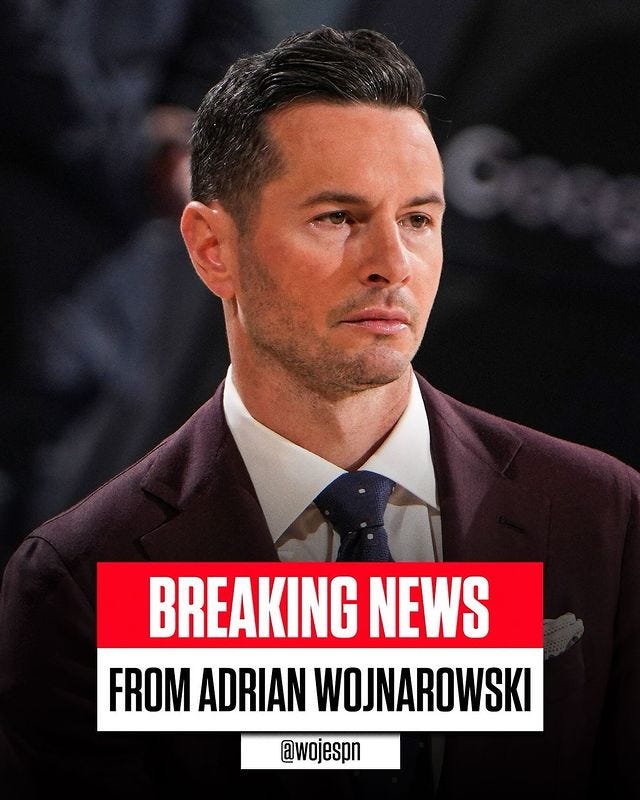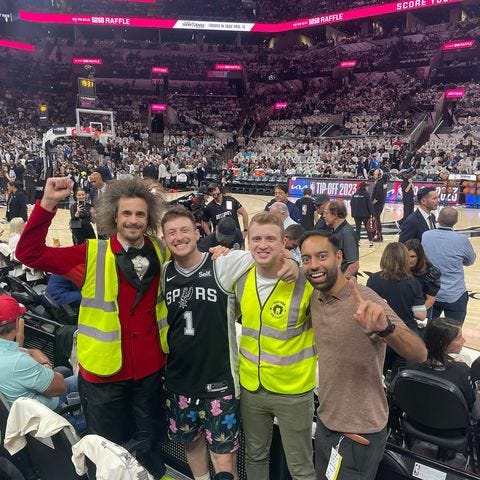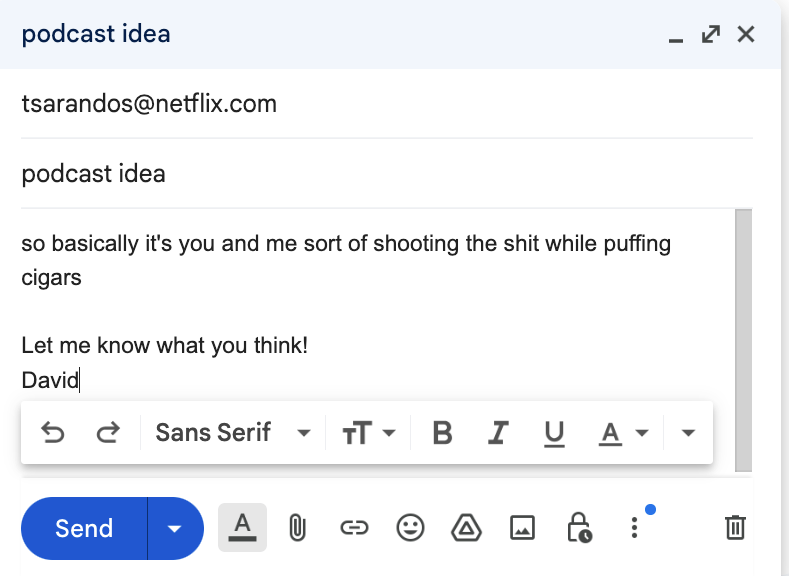JJ Redick and The Digital Third Door
Lessons from Redick's unconventional path to becoming head coach of the Lakers
Happy Friday everyone,
Welcome to the 36 (!) new subscribers since my last post. As always, if you know someone else who might enjoy reading my words, feel free to forward this over to them.
While our focus has been on digital marketing within comedy lately – today I want to talk about JJ Redick, the newest head coach of the Los Angeles Lakers.
Redick, a former NCAA college player of the year and three-point specialist on several NBA contenders, retired in 2021. Since then, he has managed to fast-track his way to the league’s premier coaching position through a series of unconventional steps, including releasing nine episodes of a video podcast called Mind the Game with LeBron James, the current star player on the Lakers (and arguable GM of the team).
While it’s not the first time a former NBA player has made the leap to coaching without any prior head coaching experience (Derek Fisher, Steve Nash, and Jason Kidd come to mind as recent examples), this feels like the first time social media has played a significant role in jump-starting an NBA head coaching career.
The past three months offer a crash course in the power of network effects, the importance of creating accessible, engaging content, and the impact of demonstrating expertise through innovative and authentic formats.
Redick’s journey can be best understood through the lens of Alex Banayan’s "Third Door" concept from his NYT best-selling book of the same name. I just read this book last month, so it’s uniquely top of mind, but it posits an interesting framework for anyone looking to bypass traditional gatekeepers and forge their own path to success.
The "Third Door" describes three ways to achieve success:
The First Door: The traditional path where most people wait in line and follow established protocols.
In basketball, this might look like grinding your way up from local high school head coach to a Division 3 college program, to Division 1, until becoming an assistant NBA coach for a decade. Then, you’ll be a lead assistant for a while until finally getting a crack at a head coaching gig.
The Second Door: The VIP entrance reserved for a select few who are already inside the system.
Think the modern day “coaching carousel”. Frank Vogel, Doc Rivers, Mike Budenholzer. While many of them initially worked their way through the first door, once you’ve hit a certain status level, it seems like you’re “in the club”.
The Third Door: The unconventional, often overlooked route that requires creativity, persistence, and a bit of audacity to find an alternative entrance.
(ENTER - JJ REDICK)
While he was still a player, Redick launched his first podcast, The JJ Redick Podcast with Tommy Alter, at The Ringer in 2017.
An early adopter of the medium, it remains one of the only NBA player podcasts worth listening to. Redick quickly became known not just as another oldhead telling stories on his podcast – unlike say, “All the Smoke” with Matt Barnes and Stephen Jackson – but as a respected basketball thinker and communicator.
JJ and Tommy eventually left The Ringer to start their own company, threefourtwo productions. They created a new podcast called The Old Man and the Three in 2020, the fall of JJ’s last season as a player, and built out a robust social media presence.
The podcast’s reach and success is undoubtedly part of what made Redick an attractive candidate for TV gigs upon retirement, ultimately becoming the lead basketball commentator for ESPN this season once Doc Rivers abruptly left the booth in January to take the newly vacant Milwaukee Bucks job1.
Redick even called opening night of ESPN’s slate this year, when Viggo did the halftime show at the Spurs game in October. He’s wearing a suit on the right:
JJ’s constant presence on national television not only enhanced his visibility, but further established his credibility in the eyes of players, fans, and executives alike.
If his end goal was to become the next great NBA commentator, than his chosen path was already a bona fide success, and worthy of a write-up in its own right.
But clearly he had other ambitions.
This is where Mind the Game, his newest podcast with LeBron James, comes in.
Here’s episode one, released just three months ago:
First and foremost, Mind the Game is objectively great content, even if the name is meh.
Personally, I would have gone with The King’s Court, or The Pod From Akron.
But what this series also subconsciously implies, is, “this guy is respected as a cerebral equal by the second-greatest player of all time”.
And this was reflected in both viewer interest and sentiment analysis.
Mind the Game amassed 655K subscribers in just 3 months on YouTube, compared to Redick’s 1.1 million subscribers on his pre-existing channel that’s 3+ years old.
While you can chalk the initial LeBump in interest up to JJ’s upgrade in co-host, their respective production companies possess an inherent understanding of making the show itself visually engaging, regardless of the talent on hand.
This is something I frequently harp on with clients in the podcast space: What am I gaining from watching you that I don’t already get from listening to you?
If you’re making video content for social media, then something interesting should always be happening in the video. And simply adding captions doesn’t count.
It’s extremely boring to watch two people sit on a couch and talk into microphones.
Instead, Redick is frequently diagramming set plays, cutting to B-roll of the actual plays in question, all while hanging out with LeBron in a totally new light – casually drinking wine and talking hoop. These visual elements made the content as watchable as it was informative. It also made complex basketball strategies accessible to a wider audience, further establishing Redick's reputation as a thought leader. It was not lost on me that each episode started with Redick alone, explaining directly to the camera any advanced terminology the two of them used in the ensuing conversation.
The timing of this was also a little lucky on JJ’s part.
LeBron famously made 8 straight NBA Finals from 2011-2018, won the Finals in 2020, and even made the Western Conference Finals last year. So for him to be swept in the first round of the 2024 Playoffs meant they could freely opine about the Conference Finals and NBA Finals by episodes eight and nine.
Lastly, the wine added an air of sophistication to their conversations. We’re not just booling with Matt Barnes and Stephen Jackson, baked out of their minds and chopping it up on the couch, these are intellectuals engaging in discourse here.
Let me be clear for those of you who don’t follow the NBA – and whose eyes might be glazing over at this point – this whole thing is objectively absurd.
How this is not some sort of egregious tampering violation, and yet the Bulls lost a draft pick because ESPN’s Adrian Wojnarowski prematurely broke the Lonzo Ball signing five minutes before Free Agency started in 2021, I’ll never know.2
This would be like Daniel Tosh starting a new podcast with Jon Stewart, breaking down old Daily Show footage over some pizza, analyzing the performance of past hosts and correspondents, demonstrating his own subject matter expertise from his Tosh.0 days, and then all of a sudden, he’s Jon’s backfill on Monday nights after the 2024 election coverage wraps.
But that’s honestly a way more likely scenario, because Tosh already succeeded in a similar gig on the same network for eleven years.
JJ hasn’t even coached at a high school level before, and was never teammates with LeBron during his 15 year playing career with six different teams. LeBron, nor anyone, has seen him command a locker room, motivate / discipline players, etc.
So I guess a better analogy to contextualize this would be if, say, Jay Baruchel started a podcast with Kenan Thompson, leveraged his experience as a role player in multiple successful Apatow ventures to articulate a deep understanding of the group dynamics at play in creating a successful Saturday Night Live sketch, and then three months later, Deadline reported Baruchel was taking the reins from Lorne Michaels after Season 50.
It’s not quite as far-fetched as Lady Gaga being appointed the Creative Director at Polaroid, but to paraphrase the once-great Kanye West, “I like some of the podcast episodes, but what the [expletive] does he know about coaching?”
It remains to be seen how this will play out. Reddick will be LeBron’s fourth coach in seven seasons in LA, and former players turned head coaches have had mixed results.
Still, even though viewership has steadily declined since episode one, Mind the Game itself can only be evaluated as a resounding success.
The platform served Redick’s – and possibly even LeBron’s – underlying goal.
JJ wasn’t after virality, he was after the right eyeballs.
He got his foot in the Digital Third Door early on, and it was down this hallway where he successfully positioned himself as the top candidate for one of the most prestigious coaching roles in all of professional sports.
The potential for wide reach from social media brings with it so many new avenues for career advancement. But too often, people focus on the former.
If you own a small business, or have a podcast of your own, what purpose does your social media presence serve? If you’re a comedian reading this, what is the overarching goal that your treadmill of stand-up clips is intending to achieve?
In other words, what is it you’re actually after, and how can you leverage the tools freely at your disposal to get there?
Now if you’ll excuse me, I have a few emails to send:
Apparently, if you want to coach an NBA team, just share the broadcasting booth with Doris Burke for three months.
And I’m not even going to touch the conspiratorial part of this story involving UConn head coach Dan Hurley also being considered for the position, nor the Shams vs. Woj and Shams Charania / FanDuel conflict of interest of it all. You can read up on that on your own time.




